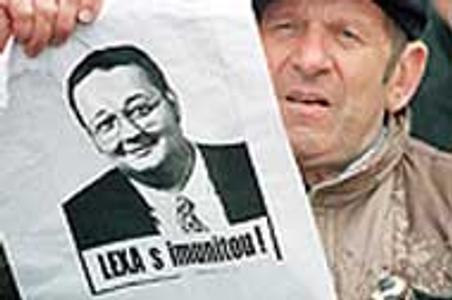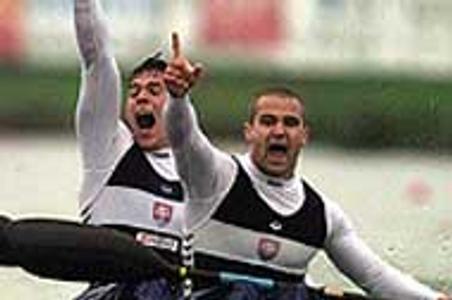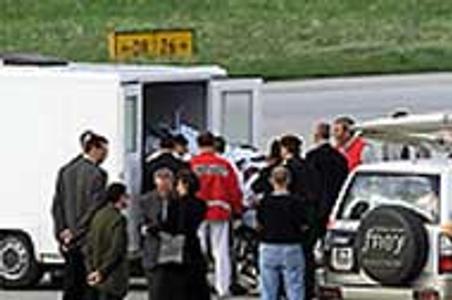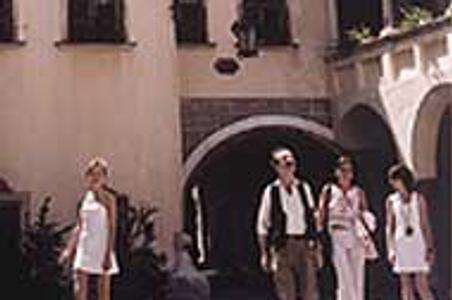Archive of articles - July 2000, page 3
If you desire to read an old article, use the search bar or select the publication date.
Sky-high fuel prices hit peak
Rocketing fuel prices in the past 13 months have forced many Slovaks to simply hang up their car keys rather than dig deeper into their pockets. The increases have also hit an already limp manufacturing sector dependent on oil. But hope has sprung anew for the ordinary citizen and Slovak industry chiefs, following an announcement that prices are to drop soon.Despite the fact that the Bratislava-based Slovnaft refinery, which has a dominant position on the Slovak oil market, buys crude oil from Russia, the globally-dominant price strategy set by OPEC (Organisation of Petroleum Exporting Countries) and fixing the price of crude oil has pushed up prices to an all-time high of 34 crowns per litre for Super 95 Natural fuel.
Migaš strengthens grip on SDĽ after party congress victory
KOŠICE: While many ruling coalition politicians had hoped that the socialist Party of the Democratic Left would choose a less controversial replacement for chairman Jozef Migaš at its July 8-9 annual congress, the party itself had other ideas, re-electing Migaš to another term with 64% support and sending a strong signal of disapproval to more moderate party members such as Finance Minister Brigita Schmögnerová and Education Minister Milan Ftáčnik.Migaš, who has been criticized by his coalition partners and party colleagues for apparently clientist relations with the Slovak-Russian financial house Dev'n banka, took the offensive at the congress and lashed out at his opponents. Although the party's 443 delegates met behind closed doors, participants later said that the chairman had slammed Schmognerová and former Democratic Left chairman Peter Weiss - a popular stance that later brought him 283 votes.
One beating too many
Imagine that you're last seen walking home at 11:00 p.m. on a Monday night near the Bratislava Old Town. You never reach home. You're discovered by the police unconscious at 5:33 a.m. covered in blood, with a fractured skull and a life-threatening concussion. The police call for an ambulance to take you away - but they don't report the incident, even though all necessary documents are in your wallet, and even though they are required to do so by law. Neither does the hospital, where you wind up in intensive care. Even though your family is trying to find you all day.This is both a warning and an indictment of the kind of care victims of a beating can expect from the police and hospitals in Slovakia. The victim in this case was Štefan Kubovič, a 20 year-old who had an argument with a taxi driver in the early morning outside the Hviezda shop on Nám. 1 maja Square (about 200 metres from the Old Town). According to a witness, he threw a beer bottle at the cab; the cabbie drew a gun, Števo ran, and the cab screeched around the corner in pursuit of him. He was discovered half an hour later lying in a parking lot 50 metres away. No one knows if he was beaten up, or if he simply fell and injured himself.
The ST saga: All's well if it ends well
The government approval of the sale of a 51% stake in Slovenské telekomunikácie has brought to an end the long-running saga of what Slovakia was going to do with one of its biggest privatisation assets.A sale that should have taken place years ago was brought to a close as one of the world's leading telecoms players, Deutsche Telekom, shelled out 40 billion Slovak crowns ($898 million) for the majority share. Hip, hip, hurrah, the first truly big Slovak privatisation at a price higher than the government had expected, a benchmark for those to come, and a pat on the back for Mikuláš Dzurinda's government.But what lessons have been learned from the process, what went right, what went wrong, and what can the government do as it heads towards the sale of a 49% stake in its cash-cow, gas company SPP, and majority stakes in its three biggest banks, Slovenská sporiteľňa, Všeobecná úverová banka and Investičná a rozvojová banka?
Fugitive spy boss Lexa stalls case
Slovakia's most wanted man, Ivan Lexa, has apparently flown the coop. Lexa, who stands accused of orchestrating the country's most infamous crime - the 1995 kidnapping of then-president Michal Kováč's son - was reported to have escaped the country on July 4, and to have ducked the nation-wide warrant issued for his arrest last week.According to a July 12 report by the private Mark'za TV station, Lexa is currently in the southern hemisphere on the Paradise Islands, a secluded tropical archipelago.While police were unable to confirm the Mark'za report, or the allegation of the Sme daily newspaper that Lexa was "somewhere in the Southern hemisphere," Interior Minister Ladislav Pittner told the TASR news agency July 12 that he had information leading him to believe that Lexa had indeed escaped Slovakia "with the help of certain foreign groups."
Flat-water kayakers streaking to gold
Looking at the brand new Škoda Fabia and Octavia cars flat-water kayaking world champions Michal Riszdorfer and Juraj Bača drive it's easy to get the impression that it pays to be a sportsman in Slovakia."We hope that our friends envy us," the two 23 year-olds admitted frankly to The Slovak Spectator during a training break on July 1 at their Komárno kayaking club in southern Slovakia.The two certainly have a reason to be self-confident. Owning the kind of muscular physiques important for kayaking, Riszdorfer and Bača have both proven their talent with wins at important championships in the run-up to the Sydney Olympics later this year. Their most significant scalps to date include taking the gold in the 500 metres K2 (double kayak) event at the 1998 World Championships and another gold at last year's World Championships in the K2 1000 metres, leaving the double world champions among the hottest candidates for Olympic gold in both events.
Maximizing Performance
Training solves problems. But only certain kinds of problems. If your workforce does not know how to do a job, then training is the right response. Here are five typical instances of where training could be utilised best:1. A new job or new system is introduced;2. Improvement in quality or timing or productivity is needed;
Minister quits after Schuster fiasco
The condition of Slovak President Rudolf Schuster was stabilised last week by doctors at a clinic in Innsbruck, Austria. While the extent of the damage to the president's health had not been determined by press time, Austrian doctors said they might be able pull Schuster out of his induced coma as early as July 7.In Slovakia, meanwhile, the fallout over the president's near-fatal encounter with pneumonia and a ruptured colon, and the country's inadequate response to it, began to claim its first victims: Health Minister Tibor Šagát resigned on July 4 after bitter criticism of the poor conditions in Slovak hospitals and the inept medical treatment given to Schuster; Ivan Hantak, the director of the Interior Ministry hospital - one of several ill-equipped hospitals Schuster was taxied between while in a coma in mid June - also resigned.
Dutch KPN drops bid for ST
Government hopes for a competitive privatisation of state telecoms firm Slovenské telekomunikácie (ST) held firm June 30 despite an eleventh hour pull-out from the ST tender by the Dutch telecoms giant KPN.A letter delivered to the Telecom Ministry, which was originally thought to contain KPN's bid, told Telecom Minister Jozef Macejko that the firm was withdrawing from the tender because it was concerned that it would not be able to exercise full management control at a privatised ST, and that formulas for setting the price of telecom services had not been defined to their satisfaction.The move has left Germany's Deutsche Telekom as the sole bidder for the state's ST stake, and comes only a few weeks after a third bidder, Telekom Austria, also withdrew from the tender.
Top Pick: Múzeum film club a respite on hot days
As the summer progresses and the mercury rises, one of the better ways to cool off is to take in a movie at one of Bratislava's numerous theatres or film clubs. And on the hottest days, the cool viewing rooms of the Múzeum film club is always a sure bet. While theatres offer the often dull-witted, mainly Hollywood-made movies sweeping western box-offices, film clubs instead show selections which have been out a bit longer and have proven to be intelligent crowd-pleasers. Listed below are future dates for Filmclub Múzeum, located right behind the historical walls of the Town Museum and accessible from Hlavné námestie (Main Square) in the Old Town.All movies are in English with Slovak subtitles and start at 19:00 in the muzeum projection hall. Tel: 5443 1473.
Government braces for tough H2 budget
Economic ministers are bracing themselves for a hard road to meeting the 18 billion crown ($403 million) budget deficit despite the release of encouraging figures for the first half of the year.While commenting on a report showing that the state budget deficit for the first six months of the year narrowed to 753.9 million crowns - only one tenth of the figure for the comparable period of last year - Finance Minister Brigita Schmögnerová said July 3 that there were still risks ahead in the budget."The budget looks very favourable for now but I can see a couple of risks in the second half of the year," the minister said July 3.
Letters to the editor
Graffiti nothing to celebrate, as US experience showsRestaurant criticism unfair, out of place in BratislavaAgainst jumping to conclusions about Slovak health care
Dopravna fourth bank collapse in 10 months
Only 24 hours after board members resigned in frustration over shareholder apathy towards a capital hike, the medium-sized bank Dopravná banka was put under a caretaker administration by the central bank.In a July 1 statement, the National Bank of Slovakia (NBS) said that that developments at the bank had proved that it was unable to cope with increasing losses, and that it had also failed to create sufficient provisions to cover classified loans.The bank's collapse comes only weeks after the government extended a controversial 2.5 billion Slovak crown ($56 million) loan to Devín banka to bail it out of its liquidity crisis, and has left the central bank scrambling to find an investor for the crumbling Dopravná.
Community Calendar
Hash RunInternational Women's Club in Bratislava
Despite doubts, Slovak officials defend 2004 EU entry date
Slovak officials dedicated to bringing the country into the European Union (EU) fold last week presented a report on their country's accomplishments towards EU membership that, they said, made Slovakia a strong candidate for joining the alliance in 2004."We are optimistic about Slovakia's entry to the EU. We want to be in the first group of countries and are doing our best to achieve this goal," Deputy Prime Minister for Integration Pavol Hamžík told The Slovak Spectator on July 4. "We think 2004 is an optimistic but still a very realistic year for Slovakia to become an EU member."But integration observers further removed from the process said that Slovakia had done the easy work first, and that many difficult areas of negotiation with the EU - such as environmental law and agricultural policy - lay ahead. Furthermore, intangibles such as political change or the speed with which parliament passed the necessary laws could lead to many unforseen hitches along the way.
Anti-corruption fight delayed till September
According to a recent World Bank survey, a majority of Slovak citizens believe that corruption in the country is rampant. But the same day the results were announced, a proposed anti-corruption plan of action, initiated in February by Prime Minister Mikuláš Dzurinda, was delayed by several months, prompting accusations that the government was still not taking the problem seriously.The World Bank survey cited the healthcare sector, the judicial system, customs offices, the National Property Fund privatisation agency and licensing authorities as the most corrupt in the country, while the military, President's office and labour offices are the least corrupt.Despite the survey results, and evidence from several other polls showing that corruption has become one of the most important issues for Slovak voters, the government has put off its much-anticipated anti-corruption legislation. Although Dzurinda and Deputy Prime Minister for Economy Ivan Mikloš had originally promised that a programme would be ready by this month, they now say voters will have to wait until September to see laws that in Dzurinda's words "build a Slovakia where you won't meet corruption."
Hardware technology
Since this is the first in a series of monthly columns I will be writing, I would like to introduce myself as Stanislav Dzurík, an employee of hardware firm Columbex International a.s. in Bratislava. In the coming months I will be discussing what is new in the world of information systems in the field of hardware technologies.When Columbex International was established in 1990, like many other computer firms our business was mainly personal computers, printers and other office and computing devices. The market was constrained by the level of development of information technologies in Slovakia at that time. It was dominated by big state-owned companies, which used big hall systems (mainframes) with strongly centralised information systems.
News Briefs
Kukan says Schmögnerová knew of UN postSDK dismisses Kováč, fails to elect new headMarkíza claims to have bought GamatexSNS irritated by ECRI racism report
- No more photos or bank statements? Slovakia moves to ease residence process
- Weekend: Celebration of fun comes to Malacky Photo
- Top 10 events in Bratislava for foreigners
- News digest: Prosecutor seeks jail for NBS Governor Kažimír as his political support wanes
- Convicted of multiple murders, Slovakia’s mafia boss seeks release from prison
- Slovakia loses another EV model to Spain as Stellantis chooses Zaragoza over Trnava
- Last Week: Slovakia’s central bank governor still faces bribery case verdict
- Slovak female triathlete shatters barriers with historic win at Himalayan event
- No more photos or bank statements? Slovakia moves to ease residence process
- Maria Theresa on the banks of Bratislava
- Weekend: Celebration of fun comes to Malacky Photo
- Top 10 events in Bratislava for foreigners
- News digest: Fico’s bloc wants to save money by restricting electoral access
- 3 free things to do in Bratislava in the next seven days
- Digital Jarvis is real now. He is coming for your to-do list
- Slovakia plans to restrict access to new medicines amid funding shortfall
- Maria Theresa on the banks of Bratislava
- No more photos or bank statements? Slovakia moves to ease residence process
- News digest: Violent gang in Bratislava is under arrest
- 3 free things to do in Bratislava in the next seven days
- The Kremlin’s security agency has a Russian contractor in Slovakia - no one has noticed
- Weekend: Celebration of fun comes to Malacky Photo
- Digital Jarvis is real now. He is coming for your to-do list
- Top 10 events in Bratislava for foreigners
- Maria Theresa on the banks of Bratislava
- A mayor resigns over €2.7 million fraud scandal at town hall
- Show me your moves! Slovak hockey stars share their best pick-up lines
- No more photos or bank statements? Slovakia moves to ease residence process
- He designed Gatwick. But this is his masterpiece
- Fico praises China and Vietnam as models, says liberal democracy has failed
- News digest: Violent gang in Bratislava is under arrest
- The compass points to Kúty, and people are starting to follow
- News digest: Prosecutor seeks jail for NBS Governor Kažimír as his political support wanes
- Slovakia loses another EV model to Spain as Stellantis chooses Zaragoza over Trnava
- Slovak female triathlete shatters barriers with historic win at Himalayan event
- Weekend: Celebration of fun comes to Malacky Photo
- News digest: Fico’s bloc wants to save money by restricting electoral access
- Slovakia plans to restrict access to new medicines amid funding shortfall
- No more photos or bank statements? Slovakia moves to ease residence process
- Top 10 events in Bratislava for foreigners More articles ›







